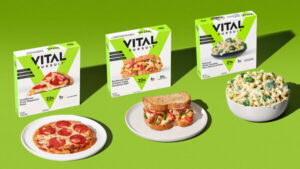Nestlé launches protein-focused products for weight management in key markets
Nestlé is tapping protein trends across geographies with solutions developed to meet specific nutritional requirements. The company has launched high-protein foods for GLP-1 users and consumers aiming for better weight management under the new brand, Vital Pursuit.

Products include the Vermont White Cheddar Mac & Broccoli Bowl, a high-protein pasta dish with pea protein. The range comprises 14 frozen ready meals in formats including sandwiches, pizzas and bowls. Chefs and dietary experts have developed the meals at the company’s R&D center in Ohio, US.
Ingredients include nutrient-dense vegetables and whole grains, with products available at major retailers in the US.
Swen Rabe, head of Nestlé’s product technology center for food in Singen, Germany, says: “Adequate protein intake is part of a balanced diet, and people often have different protein needs depending on factors such as life stage and food preferences. We’re developing products that incorporate more protein, whether for specialized nutrition and health, affordable nutrition, or to bring new tastes and flavors to our core brands.”
Addressing the protein gap
Nestlé has also launched a new Maggi variant in India made of gram flour. The noodles are “rich in protein and fiber” and incorporate locally sourced flour.
The food giant notes that food scientists at the Indian R&D center have eliminated the bitterness and astringency of chickpeas using a proprietary method. The noodles use local spices to deliver on taste and texture expectations.
“While taste is at the core of our products, we are constantly innovating to meet consumers’ needs and evolving dietary preferences. This is being done across varied geographies like India and the US, as well as across billionaire brands like Maggi and innovations like Vital Pursuit,” Nikhil Chand, head of the food strategic business unit at Nestlé.
In other moves to address the growing demand for protein, Nestlé is launching affordable foods in Chile, including Maggi Rindecarne, a plant-based meat alternative that allows consumers to gain twice as much protein in servings.
Similarly, the F&B multinational has developed Maggi Soya Chunks for Central and West African markets. The product is a soy-based dish that can improve the protein content of daily meals at costs lower than conventional animal protein.
Last month, Nestlé locked plans for its first food manufacturing plant in Saudi Arabia with investment from the Saudi Authority for Industrial Cities and Technology Zones. The project aims to produce children’s food and launch an automated production line with modern technologies for packaging and filling materials operated by highly skilled personnel in its initial stage.
Food Ingredients First
Related news
Nestlé to sell remaining ice-cream assets but commits to Froneri venture
🎧 Hallgasd a cikket: Lejátszás Szünet Folytatás Leállítás Nyelv: Auto…
Read more >Nestle USA adds prebiotic beverages
🎧 Hallgasd a cikket: Lejátszás Szünet Folytatás Leállítás Nyelv: Auto…
Read more >Related news
Generation Z: new rules on the labour market
🎧 Hallgasd a cikket: Lejátszás Szünet Folytatás Leállítás Nyelv: Auto…
Read more >Albert Heijn adds 100 new gluten-free products
🎧 Hallgasd a cikket: Lejátszás Szünet Folytatás Leállítás Nyelv: Auto…
Read more >Austria to Label “Shrinkflation” Starting in April
🎧 Hallgasd a cikket: Lejátszás Szünet Folytatás Leállítás Nyelv: Auto…
Read more >








